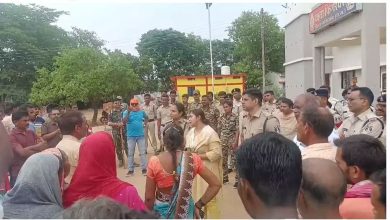Parliament should know that Article 370 decisions are undemocratic: Ruhulla
Parliament should know that Article 370 decisions are undemocratic: Ruhulla

Ganderbal (J&K): The National Conference candidate from the Srinagar parliamentary constituency, Aga Syed Ruhullah Mehdi, has said he will not participate in the assembly polls in Jammu and Kashmir as the institution of the state assembly has been “undemocratically degraded” after the abrogation of Article 370.
Mehdi, an influential Shia leader, said the parliamentary elections are important means to convey the expression of the J-K people about Article 370 to the rest of the country.
“I do not accept the status of the state assembly which it has been degraded to. I consider it an undemocratically degraded institution which we can at the best call a glorified municipality,” Mehdi said in a freewheeling interview on his campaign trail in this central Kashmir district, which is a part of the Srinagar Lok Sabha constituency.
The Srinagar constituency has been represented by three generations of the Abdullahs. Mehdi said by participating in the assembly elections and being part of “that degraded assembly”, he would be “legitimising” that status.
“That is something I do not want to do. As an individual, I do not want to give that legitimacy to the assembly and the status quo. Therefore, I am clear I am not participating in any assembly elections,” he added.
Mehdi, a former three-time MLA of central Kashmir’s Budgam assembly segment, said he was not fighting elections for power or opportunities.
“Assembly elections for me are an easier and comfortable option and that gives more opportunities to me to be in the power corridors. But accepting that assembly and being part of it would amount to legitimising that degraded assembly. I do not want to be a part of that,” he said.
Referring to the abrogation of Article 370 on August 5, 2019, Mehdi said the parliamentary polls give him an opportunity to create a political space, to resonate “this sentiment” and take this expression to the institution (Parliament) where these decisions were taken.
“Parliament should know that the decisions that it took were completely undemocratic and the people of J-K had no participation and no role to play in that decision-making. This is the institution where we need to take that sentiment, expression and opinion. Through that, I intend to take this expression to the rest of India.
“So, this is completely a different thing from the assembly and I am sure that I am not going to participate in the assembly elections for these reasons,” he added.
The former minister said the Lok Sabha elections are important because they are happening for the first time after the decisions that were taken on in 2019.
“The constitutional status that J-K enjoyed was taken unconstitutionally and undemocratically. The status of J-K was degraded and the rights and guarantees that were assured to us when we had acceded to the Union of India were snatched from us unilaterally and without the wish and will of the people.
“This abrogation happened while the entire population was put into an open-air prison,” he said.
The government had imposed a strict lockdown on August 5, 2019, restricting the movement of the people and snapping telephone service, including landline and internet services across J-K. Several mainstream leaders had been detained or were put under house arrest.
Mehdi said the Lok Sabha elections provide an opportunity to express not only to Parliament of India but also to the rest of the nation “that we do not subscribe to the status to which we have been degraded”.
“We do not accept the decisions that were taken against us on August 5, 2019 and this status of being second-class citizens is not the reason that we had acceded to the Union of India,” he said.
The NC candidate said the parliamentary elections also provide an opportunity to create a political space for “dissent and expressing the opinion which was otherwise denied to us for the last four-five years”.
“The entire population was intimidated. The media fraternity which wanted to reflect the facts on the ground was intimidated and many of them were put in jails. The activists are still in jail.
“No such atmosphere was allowed in which we would peacefully and democratically express our views. So this is an opportunity for us to express the anger and the sentiment which were otherwise denied to us,” he added.
To a question about not contesting from his bastion — north Kashmir’s Baramulla Lok Sabha seat which includes many Shia-dominated areas including his own assembly segment Budgam, Mehdi said at the moment the challenge that the people face is not local.
“It is not district-wise. It is not a challenge to a district or to a constituency. The challenge that we face, the existential crisis that we have, is the same for everyone. It is as similar for the people of Srinagar as it is for the people of Baramulla or for Budgam or Anantnag. The issues are similar. The challenge is the same,” he said.
The Shia leader said it does not matter who contests from where. He said he sees coming out of his bastion as an encouragement for him. “Standing and fighting for a cause and generating the kind of an opinion or support from areas ‘which have not been my bastion’ is an encouragement for me. It means that I am not doing localised politics. I am not doing politics for a particular sect or an area,” he said.
Mehdi said he is doing politics for the nation. The people are understanding this and they are coming along, he added.
















